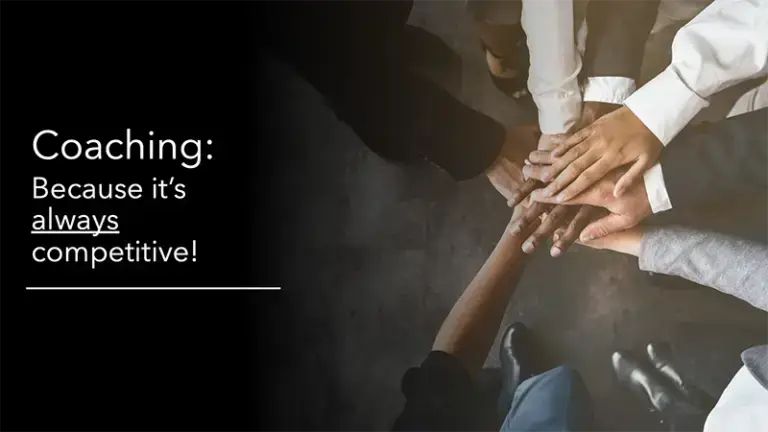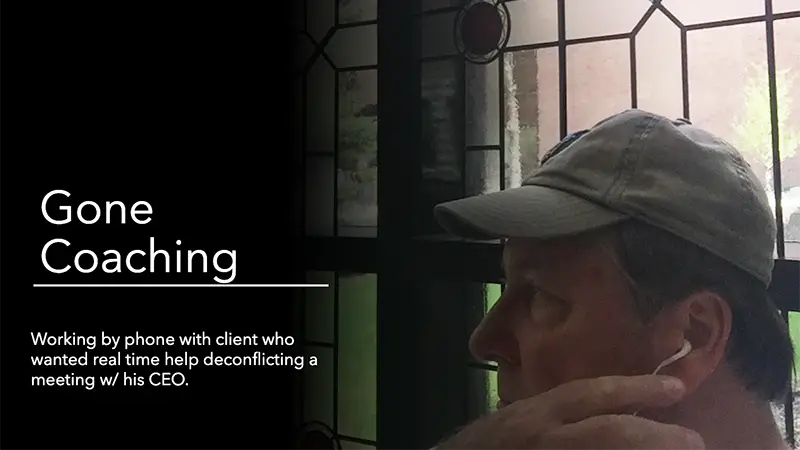Executive Coaching

Unlike speaking or training, where the message is more group-directed, we also work one-on-one in an intensely personal way with the names on the back of the jersey.
Leveraging our strength in leadership development, and backgrounds as seasoned managers we work with willing managers, executives and sponsoring organizations to accelerate the development of leadership capacity, and achieve lasting competitive advantage, generally targeted to the following outcomes:
- Preparation for advancement
- Achieving performance/behavioral improvement
- Personal Mastery
Our coaching has enabled clients to:
- Improve communication and presentation skills
- Achieve clarity and focus with respect to organizational, career, and life goals
- Recognize and deal with performance/behavioral “blind spots”
- Improve leadership effectiveness
- Achieve career advancement
- Initiate healthy career change

Why Coaching?
Three things are driving the growth of professional coaching in the 21st century:
- With the shorter cycle duration of our careers, (average job length today is <4 years), people at all levels have far less time to come to grips with each new role, master the attendant skills, and locate / prepare for the next gig, whatever it may be. No longer is it just star athletes and performers who are being coached. Rather, it’s people who feel a powerful need to level up and compete. People who want to make the most of their talent, in what little time is available to them. In some cases that coaching is sponsored and supported by the employer. In others, an increasing number of individuals are recognizing the need, filling, and funding it on their own.
- Twenty years ago most people worked for a leader who saw it as part of their role to serve as a coach. Today, not so much. Your boss has got all they can handle taking care of their own development. In most cases, your professional development has become a DIY proposition. If you’re not attending to it, it isn’t getting done. You pay the price for that with slower career advancement, and less fulfilling work.
- Third, and here’s the good news. As with many other things, the fact that we live in a much smaller world puts many more things within our grasp. It’s possible to locate, screen, hire, and start working with a professional coach for your specific need when you need it, wherever you, and they happen to be. There’s a picture on our website of a McKenzie style drift boat on the bank of Utah’s Green River below Flaming Gorge dam. It is owned by a fishing guide friend of mine. Over the years, I’ve probably fished a hundred days from that boat, or one just like it, and am often accompanied by a coaching client, and we’re choosing to use the boat, and the solitude of the river as our office. These’s another picture of me sitting in a quiet spot in the Mayo Clinic, in Rochester, MN with my trusty wireless earbuds, talking with a coaching client; and yet another picture aboard a private jet doing the same thing, working with a client at a time and method of their choosing. The point is that once we’ve got a level of trust established, we can work from anywhere, any time.
In the final analysis, I love being able to help people bend the arc and the pace of their career, and many seem to appreciate having a professional on their team who is trustworthy, knows what they are doing, and has the client’s best interests at heart. Try it… I think you’ll find yourself wondering why you didn’t start sooner.
Coaching experience:
In addition to coaching assignments involving senior leaders of large, publicly held organizations, we have worked extensively with “high potential” individuals from the lower and middle management ranks. We have also worked with clients in privately held organizations, and individuals aspiring to their first leadership assignment. Recent engagements have involved:
1. A C-level executive of a $300 million commodities business, in strengthening leadership presence and prioritization skills.
2. A 2nd level manager with a Fortune 100 distribution firm in assessing personal goals vis-à-vis those of the organization, and plotting an appropriate career strategy.
3. A ‘high potential 2nd level manager with a $20 billion medical products firm in successfully preparing for promotional opportunity.
4. Operating executives of a privately held financial services firm, neither of whom had received the benefit of prior management training of any sort.
Approach, Philosophy, and Methods
1. That coaching is an interactive process, not something that “happens to” someone
2. That the beneficiary of coaching has the right to accept or reject coaching, and the ultimate accountability for their choices and performance
3. That coaching is a performance enhancer in most (but not all) situations
What Clients Say


